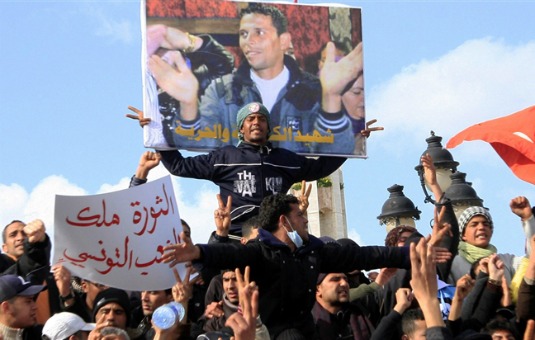How An Entrepreneur Sparked the Arab Spring

I recently had the great pleasure of hearing economist Hernando de Soto speak to a group of think tank types and media members about his perspective on the Arab Spring. De Soto is most famous as an advocate for property rights for the world’s poor.
Henando de Soto’s big argument about the Arab Spring is that despite where it may end up, its origin began with a protest over the inability for Tunisia’s poor to accumulate capital.
The case study he used to make this argument is about Mohamed Bouazizi, a street vender in Tunisia. On December 17th of 2010, Bouazizi had his vending cart seized by the police, and he lacked the funds needed to pay off the police. This action destroyed Bouazizi’s livelihood and completely derailed plans he had made to save up money to buy a truck to help with his business.
After failing in making an appeal to the authorities, Bouazizi doused himself in gasoline and immolated himself. Bouazizi’s death turned him into a martyr and his name was frequently invoked by many of the revolutionaries who took part in the Arab Spring, including the political parties in Tunisia.
What most interests de Soto is why Bouazizi immolated himself. A series of interview with friends and families of Bouazizi conducted by de Soto’s Institute for Liberty and Democracy found that his primary motivation was likely economic, not political. According to his sister, Bouazizi wanted to accumulate Ras el Mel (capital). His brother noted that Bouazizi’s ambition was “that the poor also have the right to buy and sell.”
Like many developing countries, Tunisia has a tiny formal economy and a large “extralegal” economy. To be clear this is not an illegal or underground economy, this is an economy where transactions take place for many common items but there is not even the most basic regulation and no enforcement on property rights. Bouazizi would not have been able to get his right to sell goods upheld in a court, partly because he would have had to wait years just to have his case heard. The agreements that he had to make let him run his business were not part of a broader enforcement of property rights. As he found out, they were also dependent on the whims of the police.
De Soto argues that aggressive reforms which take the extralegal economy and bring it into formal law would very positive development. What frustrates him is that there is very little discussion about this economic and property rights component to the Arab Spring.
As de Soto put it, a problem is that currently: “Bouazizi is seen as a martyr, but he is not seen as an entrepreneur.”

